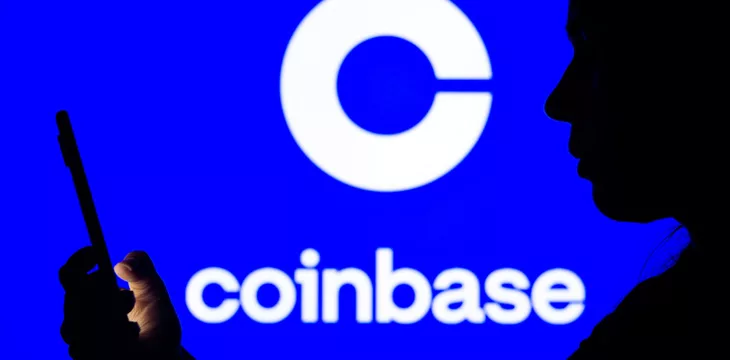|
Getting your Trinity Audio player ready...
|
Coinbase CEO Brian Armstong needs to get his stories straight in case he’s called to testify in his digital asset exchange’s legal fight with federal securities regulators.
The Wall Street Journal recently released a video in which financial editor Charles Forelle interviewed Armstrong the day after the U.S. Securities and Exchange Commission (SEC) filed a lawsuit accusing Coinbase of operating an unregistered securities exchange, broker and clearing agency.
Forelle asked Armstrong to clarify the view he and his company take regarding the legality of their operations. Armstrong immediately launched into his now go-to response, claiming that since the SEC allowed Coinbase to go public on the Nasdaq in 2021, this effectively validated Coinbase’s offering and should have immunized the cryptocurrency exchange from future prosecution.
But as the SEC’s lawsuit made clear, “declaring effective a Form S-1 registration statement does not constitute an SEC or staff opinion on, or endorsement of, the legality of an issuer’s underlying business.” Moreover, as Forelle himself reminded Armstrong, Coinbase’s S-1 and subsequent company filings acknowledge the possibility that some of the tokens it chooses to list could be considered securities.
The persistence with which Armstrong and Coinbase’s chief legal officer Paul Grewal repeat this fallacious ‘but the SEC approved us’ argument strongly suggests that they have no legitimate arguments to make in their own defense. The pair appear more focused on playing to the sympathetic social media mob of ‘crypto bros’ as well as the politicians accepting Coinbase’s lobbying largesse, evidently in the hope that the latter will rein in the SEC before the matter actually gets to court.
Armstrong’s preference for whatever side of the legal fence appears greener was on full display right from the start of the interview. Rejecting the SEC’s view that nearly all digital assets were securities, Armstrong confidently declared: “That’s just not what it says in the law.” But when pressed by Forelle regarding some of the obvious similarities between traditional securities and the tokens listed on Coinbase, Armstrong deflected with a shrug and the caveat: “I’m not a lawyer.”
Conflict of Armstrong’s interest
Forelle pressed Armstrong regarding the SEC’s view that Coinbase recklessly accelerated its token-listing decision-making process. (In early 2021, Armstrong told analysts that Coinbase would “accelerate” this process with the aim of being “first to list” new tokens as this would be “really important to our business.”)
Noting that Coinbase has a venture capital offshoot, Forelle asked whether Coinbase Ventures’ having a stake in a project was a factor in the token listing process. Armstrong didn’t answer directly, saying only: “I think most of those have been just standard venture investments in start-ups.”
Factcheck: @brian_armstrong dodged the question on whether @Coinbase invests in tokens on the platform.
I went through Coinbase Venture's entire portfolio, and found that these 30 projects were both part of their investment portfolio, as well as traded on @Coinbase exchange https://t.co/UCqy6kGpvK pic.twitter.com/ltPlhAh74x
— Pledditor (@Pledditor) June 10, 2023
Pressed for a definitive answer on whether Coinbase Ventures having a stake in a token or the company behind the token was a factor, Armstrong equivocated, saying: “Well, we don’t take any listing fees. As far as I know on the digital asset listing group, they don’t look at our personal Coinbase Venture investment. It’s not a factor.”
As online observers were quick to point out, Coinbase has listed tokens affiliated with some 30 projects in which Coinbase Ventures held a stake. Two of these tokens—NEAR and MATIC—were cited in the SEC’s Coinbase suit. In both cases, Coinbase offered users “learning rewards” payable in the tokens for participating in a quiz about the projects (and presumably buying more after the quiz).
Pumpty dumpty
Coinbase has long held a reputation as the exchange of choice for dumping the buckets of tokens that venture capital firms receive for investing in projects of dubious utility. Chief among these are a16z (Andreessen Horowitz) and Paradigm, which together accounted for no less than three members of Coinbase’s board of directors (Marc Andreessen, Fred Ehrsam and Katie Haun).
Haun has since left a16z to start her own crypto VC fund, but maintains her role as Coinbase director. In April 2021—the same month Coinbase went public on the Nasdaq—Haun gave an interview in which she revealed that “what we’re investing in at Andreessen Horowitz Crypto now largely is tokens … Are we investing in the tokens versus the equity of a particular company, and the answer is very much ‘yes.’ I could say the vast majority of our crypto funds are deployed into the tokens themselves.”
Among the first projects that the new Haun Ventures supported was Aptos, which stumbled out of the gate last October amidst—wait for it—complaints that insiders had locked up 80% of the project’s available tokens ahead of its listing on exchanges.
But tokens aren’t the only thing Coinbase directors are adept at dumping. A civil suit filed in May accused Coinbase insiders of hiding the company’s need to raise over $1 billion just one month after its Nasdaq listing. The suit claims the insiders delayed the capital raise bombshell just long enough to dump their shares—with Andreessen, Ehrsam and Haun collectively cashing out over $390 million in the week following the listing.
Ehrsam’s Paradigm appears to have realized that the ‘crypto’ party is well and truly over, having recently reworked its website’s front page to expunge any mention of its interest in ‘crypto’ or ‘Web3’ projects. (None of its Web3 projects could have ever worked as advertised because none of the blockchains they were based on could scale to accommodate Web3’s data and micropayment needs, but we digress.)
Brian not buyin’
It’s deeply ironic that Coinbase’s share price has performed much like the tokens his VC directors pump-and-dump via the exchange. After soaring in their first day of trading, Coinbase shares currently trade around one-seventh of that peak, closing Monday down another 5% to $50.56.
Armstrong himself has contributed to this downward pressure, dumping another $1.8 million worth of his shares the day before the SEC suit—the day that rival Binance got its own SEC suit—as part of his now standard walking-around-money-sell-off two or three times per month.
Even as Brian keeps selling, Cathie Wood keeps buying. Wood’s Ark Invest group added over $21 million worth of Coinbase shares the day of Coinbase’s SEC suit. Ark now holds 11.44 million shares in Coinbase, with an average holding cost of between $239 and $255. (Might be time for a rebrand to ‘Ouch Invest.’)
I’d like to report a murder
Despite its predilection for listing function-free tokens held by its own VC arm and those of its directors, Coinbase never listed BSV. This is despite the BSV blockchain’s commitment to utility—the kind of utility that Armstrong claims so many of the tokens listed on Coinbase possess and which supposedly distinguishes these tokens from securities.
Just a point concerning @coinbase.
When @TurkeyChop and I met Brian Armstrong in nChain's offices well before the IPO I explained categorically that everything they were doing fell under securities regulation.
Mr Armstrong explained how he believed it was legal until he was…
— Dr Craig S Wright (@Dr_CSWright) June 11, 2023
Armstrong not only ignored BSV, he ignored the sound advice of one of BSV’s most prominent supporters: Dr. Craig Wright. On Sunday, Wright dropped a bit of a bombshell, tweeting that he’d met Armstrong at the London offices of nChain, a world leader in Web3 and Blockchain technologies, sometime before Coinbase made its ill-fated Nasdaq debut.
Armstrong wasn’t there specifically to meet Wright, but since Wright was there, he and Armstrong were introduced. The conversation naturally turned to the subject of Bitcoin, including Wright’s views on what was needed to ensure the project’s success and the efforts he was pursuing to see that those needs were met.
Wright remembers Armstrong having a distinctly different agenda regarding digital assets. Wright says he warned Armstrong that “everything [Coinbase] were doing fell under securities regulation.”
To support this view, Wright cited a 1996 article in Kiplinger’s Personal Finance titled The Wild, Wild Web. The article’s author Gregory Spears detailed the SEC taking a dim view of web-based initial public offerings, the predecessor of the initial coin offerings (ICOs) that created so many of Coinbase’s useless shitcoins.
Wright recalls Armstrong suggesting that “until the SEC specifically told him it was a criminal act that he could do it,” a position that Wright likened to “murdering someone and then arguing ‘but no one told me it was bad.’”
Wright recalls that Armstrong and the other Coinbase execs in attendance “didn’t like what I was saying” and the conversation “ended up a little heated.” nChain executive chairman Stefan Matthews was also in attendance and concurs with Wright’s recollection of the event.
Is it possible Brian suffers amnesia ?
— Stefan Matthews (@TurkeyChop) June 11, 2023
Strongarmed
Not long after this London meeting—and just days before Coinbase’s Nasdaq debut—Wright and Armstrong would cross swords again, this time in court. Coinbase is a platinum member of the Crypto Open Patent Alliance (COPA), a group formed for the express purpose of defending its members’ desire to infringe upon Wright’s digital asset patent library.
In April 2021, COPA sued Wright in the U.K. to challenge his claim to copyright in the Bitcoin white paper. COPA claimed to be taking this action on behalf of the developers who Wright had demanded stop hosting the white paper on their websites. Others saw it as a self-serving defense of their own businesses, which had been built in part on Wright’s technical creations.
Wright struck back in May 2022, suing Coinbase and rival exchange Kraken for passing off the BTC token as Bitcoin to their respective customers. Wright maintains that the exchanges were all too aware that the BTC Core general partnership including developers had vivisected the Bitcoin protocol in order to create BTC, an inert form of ‘digital gold.’ This action betrayed the original vision of a ‘peer-to-peer electronic cash system’ as described in the white paper Wright released in 2008 under the pseudonym Satoshi Nakamoto.
The suits are still winding their way through the courts, with COPA’s white paper suit not expected to come to trial until early 2024. Anyone have odds on whether Coinbase’s board will vote Armstrong out by then?
Follow CoinGeek’s Crypto Crime Cartel series, which delves into the stream of groups—from BitMEX to Binance, Bitcoin.com, Blockstream, ShapeShift, Coinbase, Ripple,
Ethereum, FTX and Tether—who have co-opted the digital asset revolution and turned the industry into a minefield for naïve (and even experienced) players in the market.

 02-17-2026
02-17-2026 




